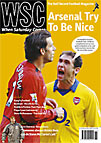 In the dizzy heights of the Premier League when emotions run high things can get out of hand
In the dizzy heights of the Premier League when emotions run high things can get out of hand
Millions of neutrals will have watched the recent Manchester United versus Arsenal match and greatly enjoyed its conclusion – even people who dislike the Premiership for what it represents will have been entertained. They may have been surprised, therefore, to learn that civilisation itself was undermined by what followed a late penalty miss. Sky, of course, were shocked by the hounding of Ruud van Nistelrooy and made sure we saw why, repeatedly, from every angle. Revulsion swept through the media – phone-ins were jammed, the tabloids brought out extra large point sizes for their headlines and the letters pages were full of tearful letters from parents about how their poor children were shocked by what they saw (while they were outside, arguing over who was going to play Martin Keown in their reconstruction).
It is odd Sky should be aghast at such gloating, as they actively encourage it in other circumstances. They do, after all, have the Fanzone feature for many of their live matches, where two supporters commentate on their respective teams and taunt each other gleefully at every opportunity. Who would put up with this for 90 minutes is anyone’s guess, but “highlights” are often shown after the match to the evident delight of Richard Keys and Andy Gray.
While chants threatening violence to the opposition are less common these days, football-related taunting is increasingly ritualised – such as the “arms outstretched” gesture after an opposing player misses a chance. Players, too, become involved with opposing crowds far more frequently – that nice Michael Owen is just one of many whose favoured reaction is to cup a hand behind his ear after scoring away from home, to emphasise the silence. Occasionally players get booked or sent off for over-zealous celebrating, especially if they run over to opposing fans, but most get away with it.
However, as countless experts, and Sports Minister Richard Caborn, have gravely informed us since the Old Trafford incident, famous footballers should be above behaving like belligerent Sunday park players. The incident, we’re told, sets a bad example for the nation’s impressionable youth. As ever, talk of footballers’ duty as role models is pompous, hand-wringing nonsense. Children don’t need Martin Keown to instruct them on how to behave childishly – they can manage that quite adequately themselves.
This is not, however, to say that it is a fuss about nothing, just that there was too much fuss. Some players, on both sides, behaved badly. Arsène Wenger himself admitted that, though belatedly and not in the strident terms used by his chairman, Peter Hill-Wood. Wenger was right to say that the incident would not have been blown up to such proportions had it not been live on television and to point out that no one was injured. It is probably the case that an equivalent row in a Third Division game would not send the Football Association rushing to hand out charges. Wenger undermined his case, though, in his insistence on carping about Van Nistelrooy’s alleged diving habit, as though he wouldn’t countenance such activities from one of his own players just a week after Robert Pires’s penalty-winning tumble against Portsmouth. And he ignores completely his side’s poor disciplinary history.
Wenger and Sir Alex Ferguson (who will pontificate on elbowing by an opponent while ignoring Roy Keane’s penchant for that offence) are like so many other managers in being no different to supporters: if your player kicks an opponent, they’re showing the commitment that is always being demanded of them; if it happens the other way around, it’s dirty play. If we are to require football managers to behave like rational adults, they should either not say anything at all – which Wenger goes halfway towards with his customary claim not to see incidents in which his players might have been culpable – or, if they’re going to criticise opposition players, they should be prepared to criticise their own, too.
Unless Wenger’s Arsenal have been singled out by referees at home and abroad, as well as by the FA and UEFA, their poor disciplinary record would suggests the manager hasn’t felt inclined to rein his players in; so someone else will have to do it for him. Their general combativeness, that often spills over into petulance, might be seen as a necessary part of being a winning team, but the bans are proving increasingly costly. Opponents and officials should be able to go about their business without having to look over their shoulders.
But much of the language used about what happened at Old Trafford is further over the top than the activities it purports to describe. The Sun’s John Sadler talked of a “Thuggish element… Yobs… Hooliganism”; Chris Waddle in the Mirror thought it “Disgraceful, unforgivable” while Jeff Powell in the Mail saw “Gross, ranting, demented behaviour”.
At time of writing, an incident in a London hotel, in which it is claimed a 17-year-old was raped by one or more players, is the subject of much speculation. If the rumours are true and the case is proved, then that is an affair which will do more than shame those involved. The language of moral outrage is devalued by its use to describe petty if persistent misbehaviour on the pitch.
From WSC 201 November 2003. What was happening this month